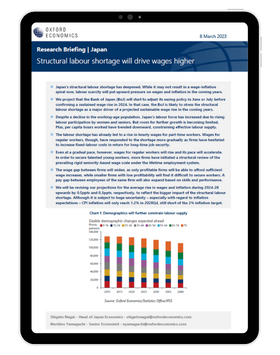Japan’s structural labour shortage will drive wages higher

Japan’s structural labour shortage has deepened. While it may not result in a wage-inflation spiral now, labour scarcity will put upward pressure on wages and inflation in the coming years.
What you will learn:
- We project that the Bank of Japan (BoJ) will start to adjust its easing policy in June or July before confirming a sustained wage rise in 2024. In that case, the BoJ is likely to stress the structural labour shortage as a major driver of a projected sustainable wage rise in the coming years.
- Despite a decline in the working-age population, Japan’s labour force has increased due to rising labour participation by women and seniors. But room for further growth is becoming limited. Plus, per capita hours worked have trended downward, constraining effective labour supply.
- The labour shortage has already led to a rise in hourly wages for part-time workers. Wages for regular workers, though, have responded to the shortage more gradually as firms have hesitated to increase fixed-labour costs in return for long-time job security.
Tags:
Related Services

Service
Asian Cities and Regional Forecasts
Key economic, demographic, and income and spending projections to 2035 for more than 400 locations across Asia-Pacific.
Find Out More
Service
Macro and Regulatory Scenarios
Our models, forecasts, and datasets can be customised to fit the unique needs of your organisation.
Find Out More
Service
Global Cities Service
Make decisions about market and investment strategies with historical data and forecasts for 900 of the world’s most important cities.
Find Out More